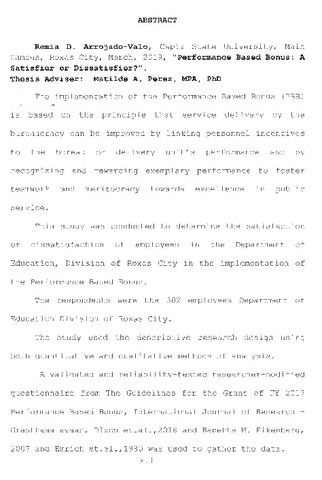Performance based bonus: a satisfier or dissatisfier?
| dc.contributor.advisor | Perez, Matilde A. | |
| dc.contributor.author | Arrojado-Valo, Remia D. | |
| dc.coverage.spatial | Capiz | en |
| dc.date.accessioned | 2024-02-01T08:14:45Z | |
| dc.date.available | 2024-02-01T08:14:45Z | |
| dc.date.issued | 2019-04 | |
| dc.identifier.citation | Arrojado-Valo, R. D. (2019). Performance based bonus: A satisfier or dissatisfier? [Masters thesis, Capiz State University Main Campus]. CAPSU Institutional Repository. | en |
| dc.identifier.uri | https://repository.capsu.edu.ph/handle/123456789/100 | |
| dc.description.abstract | The implementation of the Performance Based Bonus (PBB) is based on the principle that service delivery by the bureaucracy can be improved by linking personnel incentives to the bureau or delivery unit's performance and by recognizing and rewarding exemplary performance to foster teamwork and meritocracy towards excellence in public service. This study was conducted to determine the satisfaction or dissatisfaction of employees in the Department of Education, Division of Roxas City in the implementation of the Performance Based Bonus. The respondents were the 302 employees Department of Education Division of Roxas City. The study used the descriptive research design using both quantitative and qualitative methods of analysis. A validated and reliability-tested researcher-modified questionnaire from The Guidelines for the Grant of FY 2017 Performance Based Bonus, International Journal of Research -Granthaaalayaah, Dizon et.al.,2018 and Babette M. Eikenberg, 2007 and Emrich et.al.,1980 was used to gather the data. Data were encoded and processed for frequency, percentage, mean, t-test, analysis of variables, and linear regression using Statistical Package for Social Science (SPSS). Secondary data was used in determining the Individual Performance and Commitment Review (IPCR). The study showed that Performance-Based Bonus was Generally Implemented as perceived by respondents and they were Satisfied, they were Highly Satisfied of their Individual Performance Commitment and Review. However, there was no significant difference in the level of satisfaction except when respondents were grouped according to their current designation. The Individual Performance Commitment and Review (IPCR) ratings of the respondents did not act as significant predictor of the level of satisfaction on the IPCR. However, the level of implementation of Performance-Based Bonus (PBB) acted as a significant predictor of the respondents' level of satisfaction on the PBB. The over-all results showed that the Performance Based Bonus is a satisfier for the employees in the Department of Education, Division of Roxas City. | en |
| dc.language.iso | en | en |
| dc.publisher | Main Campus, Capiz State University | en |
| dc.rights | * | |
| dc.rights.uri | * | |
| dc.subject | Performance based bonus | en |
| dc.subject | Performance based | en |
| dc.subject | Satisfaction survey | en |
| dc.subject.lcsh | Performance | en |
| dc.subject.lcsh | Satisfaction | en |
| dc.subject.lcsh | Bonuses (Employee fringe benefits) | en |
| dc.title | Performance based bonus: a satisfier or dissatisfier? | en |
| dc.type | Thesis | en |
| dc.contributor.chair | Perez, Matilde A. | |
| dc.contributor.committeemember | Dela Cruz, Rowena Cristina D. | |
| dc.contributor.committeemember | Arcega, Ian B. | |
| dc.contributor.committeemember | Langurayan, Rolando Jr. L. | |
| thesis.degree.discipline | Public Administration | en |
| thesis.degree.grantor | Main Campus, Capiz State University | en |
| thesis.degree.level | Masters | en |
| thesis.degree.name | Master in Public Administration | en |
| thesis.degree.department | College of Management | en |
Files in this item
This item appears in the following Collection(s)
-
Masters Theses [11]

